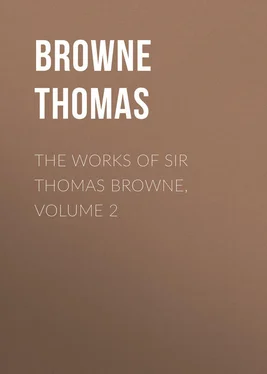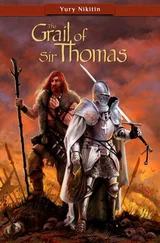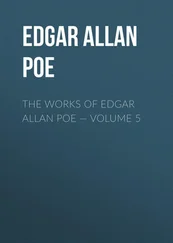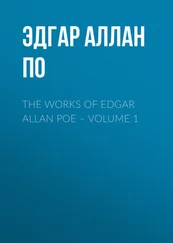Thomas Browne - The Works of Sir Thomas Browne, Volume 2
Здесь есть возможность читать онлайн «Thomas Browne - The Works of Sir Thomas Browne, Volume 2» — ознакомительный отрывок электронной книги совершенно бесплатно, а после прочтения отрывка купить полную версию. В некоторых случаях можно слушать аудио, скачать через торрент в формате fb2 и присутствует краткое содержание. ISBN: , Жанр: foreign_antique, foreign_prose, на английском языке. Описание произведения, (предисловие) а так же отзывы посетителей доступны на портале библиотеки ЛибКат.
- Название:The Works of Sir Thomas Browne, Volume 2
- Автор:
- Жанр:
- Год:неизвестен
- ISBN:http://www.gutenberg.org/ebooks/39961
- Рейтинг книги:5 / 5. Голосов: 1
-
Избранное:Добавить в избранное
- Отзывы:
-
Ваша оценка:
- 100
- 1
- 2
- 3
- 4
- 5
The Works of Sir Thomas Browne, Volume 2: краткое содержание, описание и аннотация
Предлагаем к чтению аннотацию, описание, краткое содержание или предисловие (зависит от того, что написал сам автор книги «The Works of Sir Thomas Browne, Volume 2»). Если вы не нашли необходимую информацию о книге — напишите в комментариях, мы постараемся отыскать её.
The Works of Sir Thomas Browne, Volume 2 — читать онлайн ознакомительный отрывок
Ниже представлен текст книги, разбитый по страницам. Система сохранения места последней прочитанной страницы, позволяет с удобством читать онлайн бесплатно книгу «The Works of Sir Thomas Browne, Volume 2», без необходимости каждый раз заново искать на чём Вы остановились. Поставьте закладку, и сможете в любой момент перейти на страницу, на которой закончили чтение.
Интервал:
Закладка:
For Aristotle and Oppianus who have particularly treated hereof are silent in this singularity; either omitting it as dubious, or as the Comment saith, rejecting it as fabulous. Pliny speaketh generally, affirming only, the digestion is wonderful in this Animal; Ælian delivereth, that it digesteth stones without any mention of Iron; Leo Africanus , who lived in those Countries wherein they most abound, speaketh diminutively, and but half way into this assertion: Surdum ac simplex animal est, quicquid invenit, absque delectu, usque ad ferrum devorat : Fernelius in his second De abditis rerum causis , extenuates it, and Riolanus in his Comment thereof positively denies it. Some have experimentally refuted it, as Albertus Magnus ; and most plainly Ulysses Aldrovandus , whose words are these: Ego ferri frusta devorare, dum Tridenti essem, observavi, sed quæ incocta rursus excerneret , that is, at my being at Trent, I observed the Ostrich to swallow Iron, but yet to exclude it undigested again.
Now beside experiment, it is in vain to attempt against it by Philosophical argument, it being an occult quality, which contemns the law of Reason, and defends it self by admitting no reason at all. How ( possibly ) the stomack of the Ostrich may alter Iron . As for its possibility we shall not at present dispute; nor will we affirm that Iron ingested, receiveth in the stomack of the Ostrich no alteration at all; but if any such there be, we suspect this effect rather from some way of corrosion, then any of digestion; not any liquid reduction or tendance to chilification by the power of natural heat, but rather some attrition from an acide and vitriolous humidity in the stomack, which may absterse and shave the scorious parts thereof. So rusty Iron crammed down the throat of a Cock, will become terse and clear again in its gizzard: So the Counter which according to the relation of Amatus remained a whole year in the body of a youth, and came out much consumed at last; might suffer this diminution, rather from sharp and acide humours, then the strength of natural heat, as he supposeth. So silver swallowed and retained some time in the body, will turn black, as if it had been dipped in Aqua fortis , or some corrosive water, but Lead will remain unaltered; for that mettal containeth in it a sweet salt or sugar, whereby it resisteth ordinary corrosion, and will not easily dissolve even in Aqua fortis . So when for medical uses, we take down the filings of Iron or Steel, we must not conceive it passeth unaltered from us; for though the grosser parts be excluded again, yet are the dissoluble parts extracted, whereby it becomes effectual in deopilations; and therefore for speedier operation we make extinctions, infusions, and the like, whereby we extract the salt and active parts of the Medicine; which being in solution, more easily enter the veins. What the Chymists would have by their Aurum Potabile. And this is that the Chymists mainly drive at in the attempt of their Aurum Potabile ; that is, to reduce that indigestible substance into such a form as may not be ejected by siege, but enter the cavities, and less accessible parts of the body, without corrosion.
The ground of this conceit is its swallowing down fragments of Iron, which men observing, by a froward illation, have therefore conceived it digesteth them; which is an inference not to be admitted, as being a fallacy of the consequent, that is, concluding a position of the consequent, from the position of the antecedent. For many things are swallowed by Animals, rather for condiment, gust or medicament, then any substantial nutriment. So Poultrey, and especially the Turkey, do of themselves take down stones; and we have found at one time in the gizzard of a Turkey no less then seven hundred. Now these rather concur unto digestion, then are themselves digested; for we have found them also in the guts and excrements; but their descent is very slow, for we have given them stones and small pieces of Iron, which eighteen days after we have found remaining in the gizzard. And therefore the experiment of Langius and others might be fallible, whilst after the taking they expected it should come down within a day or two after. How Cherry-stones may be thought to prevent surfets upon eating Cherries. Thus also we swallow Cherry-stones, but void them unconcocted, and we usually say they preserve us from surfet; for being hard bodies they conceive a strong and durable heat in the stomack, and so prevent the crudities of their fruit: And upon the like reason do culinary operators observe, that flesh boiles best, when the bones are boiled with it. Thus dogs will eat grass, which they digest not: Thus Camels to make the water sapid, do raise the mud with their feet: Thus horses will knable at walls, Pigeons delight in salt stones. Rats will gnaw iron, and Aristotle saith the Elephant swalloweth stones. And thus may also the Ostrich swallow Iron; not as his proper aliment, but for the ends above expressed, and even as we observe the like in other Animals.
And whether these fragments of Iron and hard substances swallowed by the Ostrich , have not also that use in their stomacks, which they have in other birds; that is, in some way to supply the use of teeth, by commolition, grinding and compression of their proper aliment, upon the action of the strongly conformed muscles of the stomack; as the honor’d Dr. Harvey discourseth, may also be considered.
What effect therefore may be expected from the stomack of an Ostrich by application alone to further digestion in ours, beside the experimental refute of Galen , we refer it unto considerations above alledged; Or whether there be any more credit to be given unto the Medicine of Ælian , who affirms the stones they swallow have a peculiar vertue for the eyes, then that of Hermolaus and Pliny drawn from the urine of this Animal; let them determine who can swallow so strange a transmission of qualities, or believe that any Bird or flying Animal doth separately and distinctly urine beside the Bat.
That therefore an Ostrich will swallow and take down Iron, is easily to be granted: that oftimes it pass entire away, if we admit of ocular testimony not to be denied. And though some experiment may also plead, that sometimes they are so altered, as not to be found or excluded in any discernable parcels: yet whether this be not effected by some way of corrosion, from sharp and dissolving humidities, rather then any proper digestion, chilifactive mutation, or alimental conversion, is with good reason doubted.
CHAPTER XXIII
Of Unicorns Horn
Great account and much profit is made of Unicorns horn , at least of that which beareth the name thereof; wherein notwithstanding, many I perceive suspect an Imposture, and some conceive there is no such Animal extant. Herein therefore to draw up our determinations; beside the several places of Scripture mentioning this Animal (which some may well contend to be only meant of the Rhinoceros Some doubt to be made what ראם signifieth in Scripture .) we are so far from denying there is any Unicorn at all, that we affirm there are many kinds thereof. In the number of Quadrupedes, we will concede no less then five; that is, the Indian Ox, the Indian Ass, the Rhinoceros, the Oryx, and that which is more eminently termed Monoceros , or Unicornis . Some of the list of fishes; as that described by Olaus , Albertus and others: and some Unicorns we will allow even among Insects; as those four kinds of nasicornous Beetles described by Muffetus .
Читать дальшеИнтервал:
Закладка:
Похожие книги на «The Works of Sir Thomas Browne, Volume 2»
Представляем Вашему вниманию похожие книги на «The Works of Sir Thomas Browne, Volume 2» списком для выбора. Мы отобрали схожую по названию и смыслу литературу в надежде предоставить читателям больше вариантов отыскать новые, интересные, ещё непрочитанные произведения.
Обсуждение, отзывы о книге «The Works of Sir Thomas Browne, Volume 2» и просто собственные мнения читателей. Оставьте ваши комментарии, напишите, что Вы думаете о произведении, его смысле или главных героях. Укажите что конкретно понравилось, а что нет, и почему Вы так считаете.












